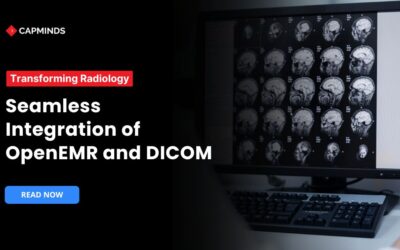The Role of OpenEMR in Managing the Complexities in Chronic Conditions and Mental Health Care
Chronic conditions and mental health care often intersect and impact each other significantly. Managing them simultaneously becomes challenging. Traditional healthcare systems frequently treat these aspects separately which might lead to fragmented care and missed opportunities for better treatment.
Using OpenEMR for the solution. It offers a unified platform for comprehensive care for mental health and chronic conditions. In this blog post, we have shared the role of OpenEMR in managing the complexities of Chronic conditions and Mental Health care, and its advanced features.
Why Chronic Conditions and Mental Health Care Require a Unified Platform
Chronic management and mental health care need to be delivered in an integrated manner without gaps in the system so that clients get the best quality treatment. Many clients with chronic conditions like diabetes or hypertension suffer from mental health problems like anxiety or depression.
However, traditional healthcare delivery systems cannot bridge the gap between physical and mental health care and deliver fragmented care.
A unified platform, like OpenEMR, unifies these two critical aspects under one common roof. By consolidating patient data, care providers can understand the patient’s health history, treatment, and advancement. This integration lets the care teams coordinate better and facilitates better communication.
Mental health conditions receive concurrent treatment along with their physical counterparts.
The result is a comprehensive care strategy that enhances patient outcomes while minimizing the responsibilities involved in managing multiple conditions.
OpenEMR and Its Features
OpenEMR is an open-source electronic medical records system. The ONC has given it its full clearance, making it a comprehensive EMR. OpenEMR stands out among the other free EMR choices.
Many OS systems like Linux, Mac OS X, and Windows are compatible with OpenEMR.
With over 5000 installs and 7000 monthly downloads in the US alone, OpenEMR software is reportedly one of the most popular free EMRs. Typical OpenEMR features and modules include the following:
- Patient Scheduling
- Clinical Decision Rules
- Electronic Medical Records
- Patient Demographics
- Medical Billing
- Patient Portal
- E-Prescriptions
- Clinical Reports
- Multilanguage Support
- Security & support
Related: How Integrations Made Easy With OpenEMR [Undiscovered Features + Benefits]
Advanced Features of OpenEMR for Chronic and Mental Health Care
OpenEMR provides all the basic functionalities and a suite of advanced features designed to meet the unique demands of chronic conditions and mental health care.
- Telehealth Integration: OpenEMR’s telehealth integration enables providers to offer virtual consultations. They can also monitor chronic conditions remotely, document patient progress, and make necessary adjustments in real-time.
- Customizable Templates: Another feature OpenEMR offers is customizability through templates, which assist in preparing forms. Templates can allow fields for mood assessment, cognitive behavioral therapy plans, or psychometric evaluations.
- Population Health Tools: Using OpenEMR’s population health tools, providers can analyze the population-wide health trends of their patient base, identify target at-risk populations, and put in place appropriate interventions.
Related: The Integration of Telehealth with OpenEMR: What You Need to Know
The Role of OpenEMR in Managing the Complexities in Chronic Conditions and Mental Health Care
1. Biopsychosocial Impact
- Chronic conditions can have a profound biopsychosocial impact on individuals, affecting their mental well-being.
- Conditions like diabetes, cardiovascular disease, and chronic pain can lead to increased stress, anxiety, depression, and decreased quality of life.
- OpenEMR provides a holistic approach by integrating mental health and chronic disease management within a single platform, allowing clinicians to address the interconnected needs of patients.
2. Co-occurring Disorders
- Chronic conditions often coexist with mental health disorders
- For example, individuals with diabetes may have higher rates of depression, and those with heart disease may experience anxiety
- OpenEMR enables clinicians to capture and manage information about both chronic conditions and mental health diagnoses comprehensively, facilitating coordinated care and improving treatment outcomes
3. Medication Management
- Individuals with chronic conditions may require multiple medications, which can impact their mental health.
- Some medications used to manage chronic conditions can have side effects that affect mood, cognition, or sleep.
- OpenEMR’s medication management features help track and monitor medication regimens, enabling clinicians to identify potential interactions, adjust dosages, and evaluate the impact on mental health.
4. Health Behavior and Lifestyle
- Chronic conditions often require individuals to make significant lifestyle changes like adopting healthier diets, increasing physical activity, and managing stress.
- OpenEMR supports the integration of behavioral health interventions within the care plan, providing tools to track patient behaviors, set goals, and monitor progress.
- This helps address psychological barriers and promote positive health behaviors.
5. Patient Engagement and Self-Management
- Managing chronic conditions and mental health requires active patient engagement and self-management
- OpenEMR offers patient portal functionalities that empower individuals to access their health information, communicate with their care team, view educational resources, and actively participate in their care.
- This promotes self-care, shared decision-making, and adherence to treatment plans.
6. Care Coordination and Communication
- Coordinating care between multiple providers is crucial for individuals with chronic conditions and mental health needs.
- OpenEMR facilitates care coordination by enabling secure communication and data sharing among healthcare professionals involved in the patient’s care.
- This enhances collaboration, reduces fragmented care, and ensures a holistic approach to treatment.
7. Data Integration and Analytics
- OpenEMR’s data integration and analytics capabilities allow for a comprehensive view of patient’s health data.
- Clinicians can track and analyze both physical and mental health parameters over time, identify trends, and make informed decisions regarding treatment plans.
- This promotes evidence-based care, early intervention, and proactive management of both chronic conditions and mental health.
8. Outcome Measurement and Reporting
- OpenEMR supports outcome measurement and reporting for both chronic conditions and mental health outcomes.
- Clinicians can track treatment effectiveness, monitor patient progress, and generate reports for quality improvement initiatives.
- This helps optimize care, identify gaps, and demonstrate the impact of interventions.
CapMinds OpenEMR Customization and Integration Solution
CapMinds OpenEMR consigns clinicians with the best features and ways to integrate. It makes their workflows more efficient and filtered.
The integrated features will allow them to combine the ability of patient record management with conceptual and concurrent reminders. This enhances the process of decision-making and improves patient care and quality.
- At CapMinds, OpenEMR custom solutions are developed with much curation and accuracy to match the special practice needs.
- It will be low-cost, and the perfect budget solution for your practice’s long-term future.
- CapMinds OpenEMR prioritizes secure data management & ensures compliance with industry regulations, offering healthcare providers peace of mind.
Get the best technologies and HIPAA-compliant and efficient OpenEMR that can be tailored to fit your practice from CapMinds.
Our OpenEMR services facilitate a Modern User Interface (UI), customization, production support & training. Also facilitates billing, report & specialty enhancements, clearing house integrations, e-prescription, cloud, and more.
“Get the most experienced, proven, and perfect professional support for your OpenEMR”




